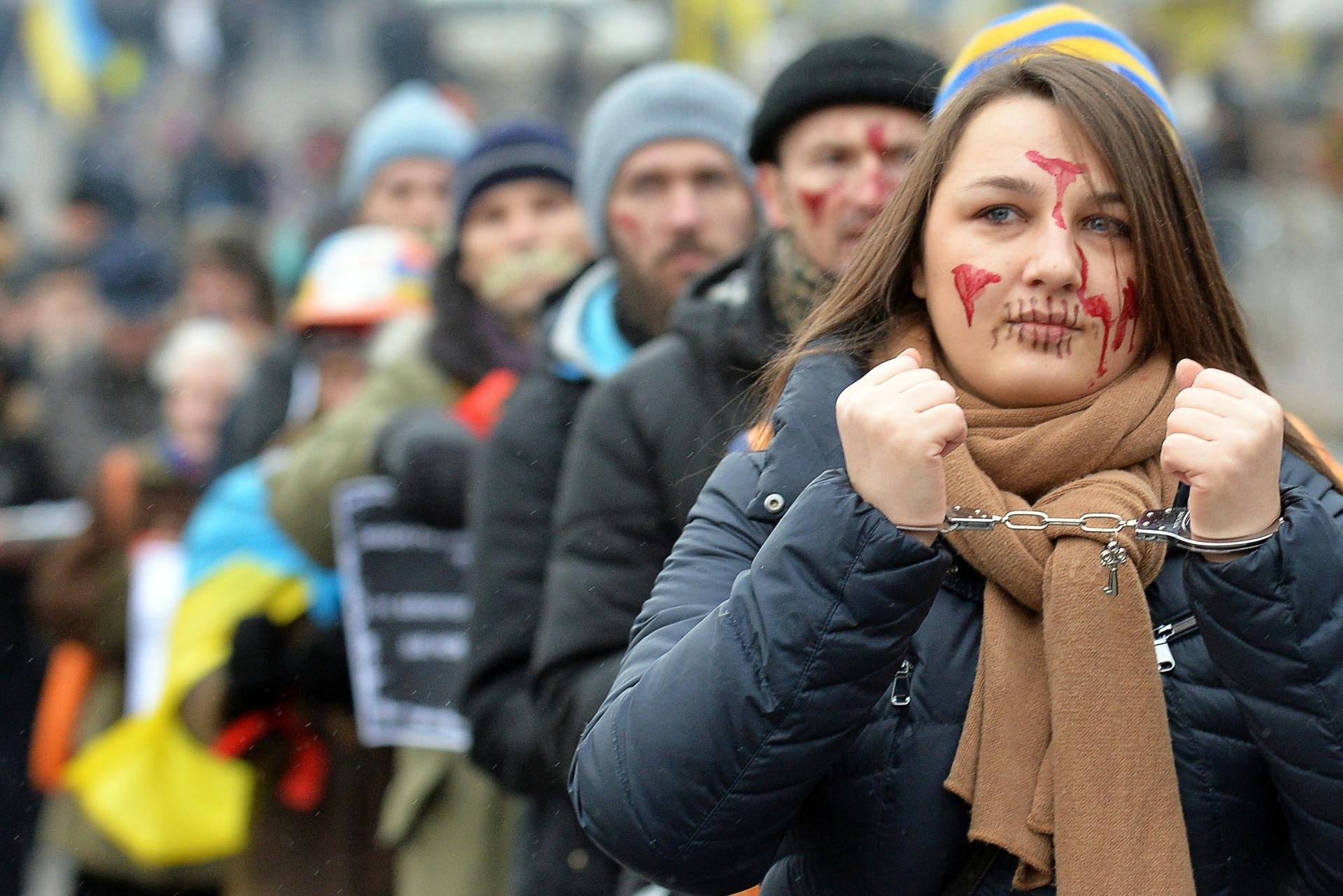The EU’s Ukraine dilemma
Pro-European activists protest outside the president’s office in Kyiv, Ukraine.
LISBON, Portugal — The words splashed across the front page of the French newspaper Liberation last week sent a clear message to European leaders about what's at stake in the battle for Ukraine's future.
"They died for Europe," the paper headlined over a full-page photo of a faceless phalanx of armed riot police on the streets of Kyiv.
So far, at least four civilians have been killed since the police cracked down on protesters who have been on the streets since November to demand a democratic European future for their country.
More than 30 are reported missing and dozens have been arrested.
With violence rising and demonstrations spreading across the country, Ukraine's former president Leonid Kravchuk warned Wednesday that the country of 45 million was on "the brink of civil war."
The EU's foreign policy chief Catherine Ashton is in Kyiv for talks with both sides. She said on Wednesday that she was "shocked" by the violence and told the government it's responsible for setting up a political process to end the crisis.
During an earlier visit, Ashton — like several other European leaders — visited the capital's main protest camp, drawing criticism from government supporters and the Russian authorities.
But critics say such symbolic actions aren’t enough.
Europe could be facing its gravest risk of conflict since the Balkan wars of the 1990s, a danger made scarier by the polarized positions of Russia and the West.
The crisis began in November after pressure from the Kremlin helped persuade Ukraine's President Viktor Yanukovych to pull out of a wide-ranging economic and political "association agreement" with the European Union. Instead, he accepted a $15 economic bailout from Moscow.
Fear that Ukraine would be cut off from Western democracy and relative prosperity triggered demonstrations that began in Kyiv's main square, the “Maidan,” and spread across the country.
For many in Western Europe, where blasé or even hostile attitudes towards the EU are common, the Ukrainians’ intensity of passion has come as a reminder of the union's core values.
"The millions of Ukrainians who have ignored the freezing cold to express their desire for the European future of their country provide inspiration for all Europeans," said a statement Wednesday from the Union of European Federalists, a group promoting closer ties among EU nations.
However, some in Ukraine are growing disillusioned with what they see as a lack of support from the EU.
While Canada has already imposed a travel ban on some Ukrainian officials and the United States is considering targeted financial sanctions against those judged responsible for the violence, the EU has so far ruled out punitive measures against the Yanukovych regime.
"Definitely Europe has abandoned Ukraine," novelist Andrey Kurkov told the British newspaper The Guardian last week. "Apart from the Polish president and the Lithuanian president, nobody else is taking events in Ukraine seriously."
Although officials from EU members closer to Ukraine's borders and wary of instability on their doorstep have been urging a more active approach, including sanctions, the bloc's headquarters in Brussels, Belgium, argues the softer line could be beginning to pay off.
They point to the Ukrainian parliament's decision to reverse recent laws restricting the right to demonstrate, a government reshuffle and Yanukovych's agreement on a conditional amnesty for detained protesters, as sign that verbal pressure from Brussels is bringing results.
Sanctions, say officials at EU headquarters and key capitals such as Berlin, could jeopardize hopes for Europe to mediate a deal between Yanukovych and the opposition that would avert further bloodshed.
Others aren’t convinced.
"The EU response has been inadequate, amounting to little more than statements," says Amanda Paul, a specialist on the region at the European Policy Center, a Brussels think tank.
"Yanukovych needs to be forced into a genuine dialogue,” she added in an interview. “Many of Ukraine’s political elites and oligarchs have considerable financial assets in Europe. These could be frozen. By not taking stronger measures, it sends out a negative signal to those in streets who are protesting under the EU flag."
EU diplomats are wary that sanctions could exacerbate an already tense situation.
They’re also concerned about straining relations with Russia. The chilly state of Moscow-Brussels ties was clear this week when President Vladimir Putin flew to EU headquarters for his twice-yearly summit with EU leaders.
Instead of the usual two-day talkfest, the meeting was cut back to just three hours. Putin used the occasion to warn the EU against supporting the Ukrainian protesters. “Considering the specifics of relations between Russia and Ukraine, it is simply unacceptable,” he told a news conference.
More from GlobalPost: Country in crisis? Just take a sick leave!
While the EU dithers over sanctions, Putin acted forcibly this week to crank up pressure on the Ukrainian opposition, warning that he'll withhold $15 billion in cheap gas and credit desperately needed by Ukraine's battered economy until there's a stable government back in place in Kyiv.
Ukrainian exporters are also reporting their goods are getting held up on the Russia border — a tactic used by Moscow late last year to push Yanukovych into rejecting the EU deal.
EU leaders eager to avoid confrontation with Moscow are hoping to sway Putin by insisting a westward turn by Ukraine would bring benefits to Russia. They’re also offering to explore Putin's proposal for a wider "European home" that would include Russia and its neighbors in an economic and political cooperation zone.
But such vague concepts are offering little solace to the protesters manning the barricades through the sub-zero nights of the Ukrainian winter.
Our coverage reaches millions each week, but only a small fraction of listeners contribute to sustain our program. We still need 224 more people to donate $100 or $10/monthly to unlock our $67,000 match. Will you help us get there today?
